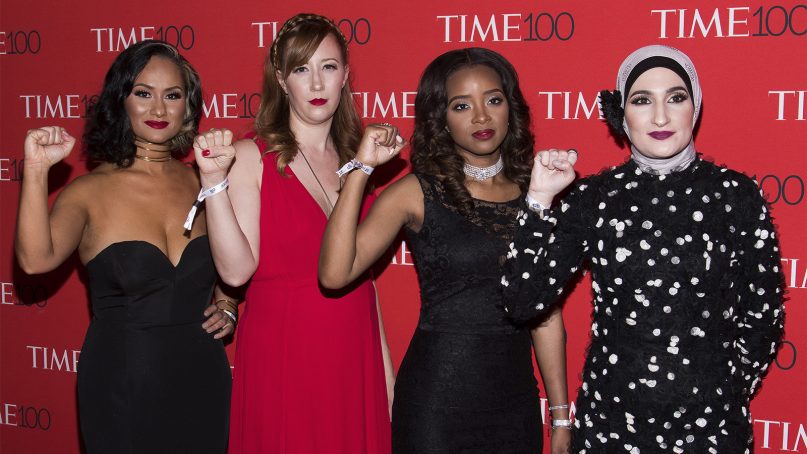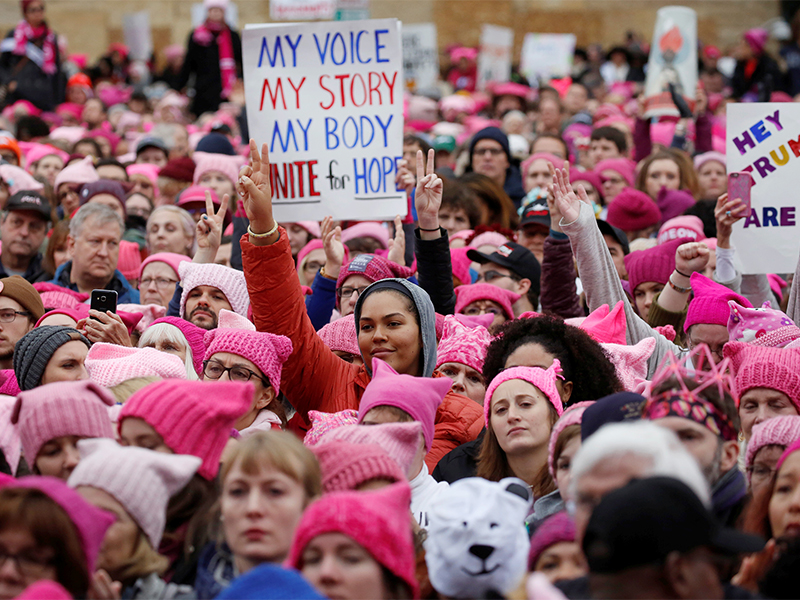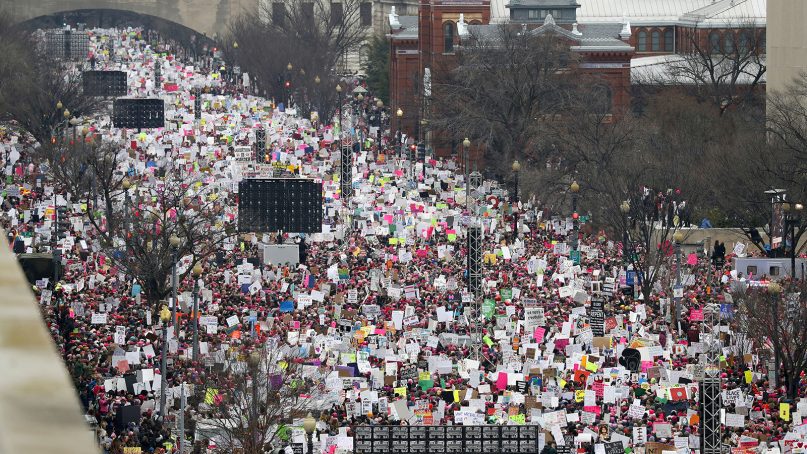(RNS) — In mid-December, leading activist rabbis Ellen Lippman and Barat Ellman of Brooklyn invited a group of progressive rabbis, including me, to a private meeting with the leaders of the Women’s March. They hoped that with proper facilitation and ground rules, we could delve into the accusations of anti-Semitism against the march’s organizers that had convinced many who supported the movement two years ago to disassociate from it.
I was skeptical. Like many other rabbis in New York, I felt the march had been tarnished by some of the organizers’ remarks and an association with Nation of Islam leader Louis Farrakhan. But I trusted that Ellen and Barat would create an environment conducive to a productive conversation, even about incredibly painful topics.
So last Wednesday evening (Jan. 9), days before the third march on the National Mall, a dozen other rabbis and I met with Linda Sarsour, Tamika Mallory and a handful of their colleagues for a dialogue about our concerns.

Women’s March organizers Carmen Perez, from left, Bob Bland, Tamika D. Mallory and Linda Sarsour attend the Time 100 Gala, celebrating the 100 most influential people in the world, at Frederick P. Rose Hall, Jazz at Lincoln Center, on April 25, 2017, in New York. (Photo by Charles Sykes/Invision/AP)
After three hours of intense conversation and mutual vulnerability, I came away with further questions — and renewed confidence that Linda and Tamika would address them with sincerity in the weeks ahead.
So, too, did eight other rabbis with whom I collaborated in issuing a joint statement.
After asking tough questions and receiving honest answers from the Women’s March leaders, I now plan to take part in the march this weekend. I am hopeful that over time we can rebuild trust and raise the voices of more Jewish leaders — especially Jews of color — in the movement.
RELATED: Jewish women divided over Women’s March face difficult choices
Jewish tradition affirms the importance of confronting those who have wronged us. Leviticus 19:17 commands, “You shall not hate your brother in your heart; You shall certainly rebuke your friend; but you shall not bear a sin on his account.”
Our sages suggest that we are obligated to rebuke the wrongful actions of people we care about — because of our fundamental belief that people are capable of change, t’shuvah. If you fail to confront people about their actions you bear partial responsibility, because you have not given them the chance to change — or prevent future wrongdoing.
Still, you might ask, what gave us reason for such optimism?
First, it became clear that the Women’s March leaders had not acted with intentional anti-Semitism. Did they make serious mistakes? Yes, and they have acknowledged as much. While their mistakes have had a negative impact, I do not believe they acted with malice. The tears that Tamika and Linda shed as they spoke were real and heartfelt.

People gather for the Women’s March on Washington near the National Mall on Jan. 21, 2017. Photo by Shannon Stapleton/Reuters
It was also evident that the Women’s March had become a victim of its own success. Its meteoric rise in the months following the 2016 election prevented us from recognizing that it is still very much a startup, to use Linda Sarsour’s turn of phrase. Its leaders took the helm just eight weeks before the initial march and, even with such a short runway, organized the largest single day of protest in American history.
The roles its leaders inhabited changed almost overnight, and they are still adapting to them. When Mallory attended the Farrakhan rally, it is not clear she understood that her very presence would be interpreted to mean that the Women’s March was condoning his hate-filled messages.
Last week’s meeting also provided an opportunity for Jewish leaders to pose our questions and concerns to the Women’s March leaders and receive direct and specific answers. Here are some of the most helpful.
Why wouldn’t Mallory denounce people who espoused anti-Semitism, most specifically Minister Farrakhan?
-
- Because as a matter of policy, the Women’s March leaders do not denounce human beings — not even white supremacists or those who have threatened their lives and their families. Instead, they denounce specific actions and words — and they did rebuke Farrakahn’s anti-Semitic rhetoric.
Why did Mallory take a photo with Farrakhan and say positive things about him? Because of the direct support he gave her child, ensuring that he could get to and from school safely in a difficult neighborhood. She was grateful to him for his personal interventions in her life, but she did not and does not endorse his venomous words or hateful views.
Why have Sarsour and other Women’s March speakers harped on Israel? Sarsour indicated her need to speak authentically from her own experience as a Palestinian-American, including pointed criticism of Israeli policies and actions.
Even so, her criticism of Israel has never been accompanied by a dogmatic refusal to engage with Jews. She took a real risk within her own community and invited a self-proclaimed Zionist, Rabbi Sharon Brous, to speak at the 2017 Women’s March in order to ensure better representation from the Jewish community and a plurality of voices. Sarsour has also been in extensive dialogue with Israelis, because she believes in meaningful relationships in spite of profound political differences.
Did the Women’s March leaders cut Jewish women out of leadership roles and erase the contributions of Jews to their movement? They do not believe they ever pushed out Jewish leaders in the ways indicated by investigative reporters from Tablet magazine, but they did agree there had been an erasure of Jewish women both in the Women’s March and historically in American women’s movements. They have recognized this past failure and committed to concrete actions to rectify it. Specifically, the Women’s March has welcomed three Jewish leaders onto its steering committee and invited Jewish organizations into its circle of organizational partners.

Organizers estimated 10,000 people attended the Women’s March at Washington Square Park in Kansas City, Mo., on Jan. 21, 2017. Millions of people demonstrated nationwide. RNS photo by Kit Doyle
I found these responses surprising and helpful. Each answer led to other questions, and I have many more. But I was convinced the Women’s March leaders were taking part in a deeply introspective process and doing their utmost to ensure that American Jews genuinely had a place in one of the key social movements of our time.
The great Jewish philosopher Moses Maimonides suggests that if we find ourselves in a situation similar to one where we’ve stumbled before and this time take the right action, it shows we are changing. Tamika Mallory did just that with her full condemnation of anti-Semitism on a radio show on Tuesday (Jan. 15). She even used language and ideas that came up within our conversation — and applied them faithfully in public to show she is serious about dialogue and change.
I understand the principled reasons many American Jews plan to sit out this year’s march or attend alternative events. The hurt, anguish and anger that the Jewish community has felt about the Women’s March is real and valid.
But the most effective way to address it is by showing up and leaning into this difficult dialogue — and affirming our place within the movement. Count on seeing me among the crowds in New York’s Foley Square this weekend, and in continued dialogue about anti-Semitism and white supremacy in the weeks and months to come.
(Joshua Stanton is a congregational rabbi in Manhattan. The views expressed in this commentary do not necessarily represent those of Religion News Service.)





